In a class of their own
When Danish cycling veteran Henrik "Rico" Elmgreen, organiser of the Copenhagen six day race, was...
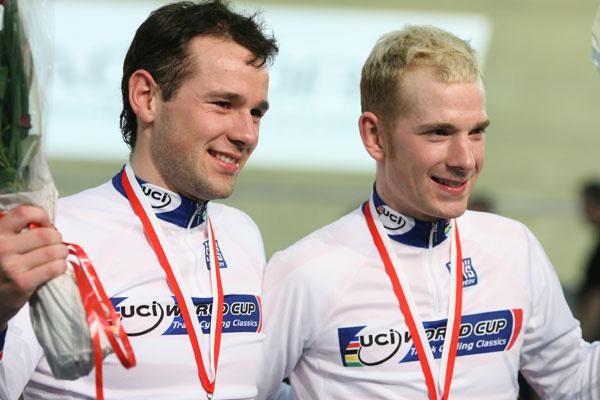
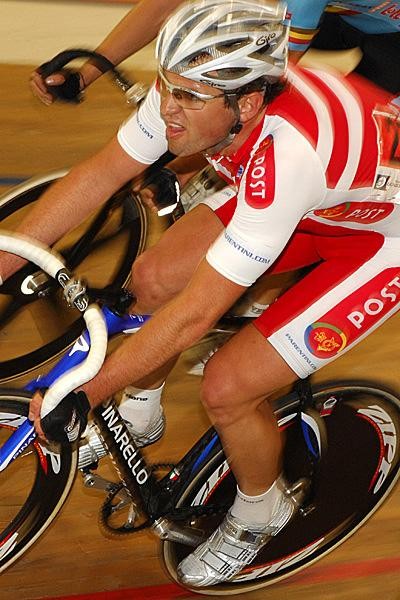
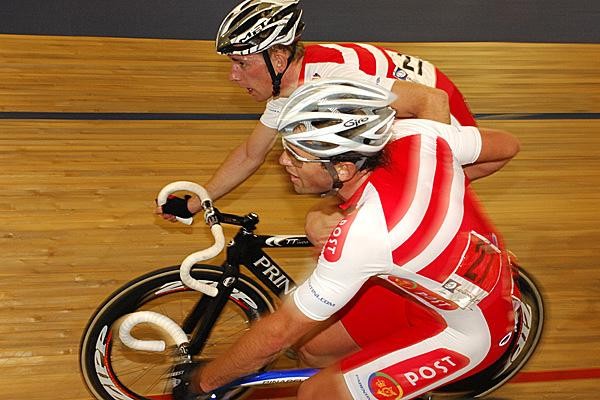
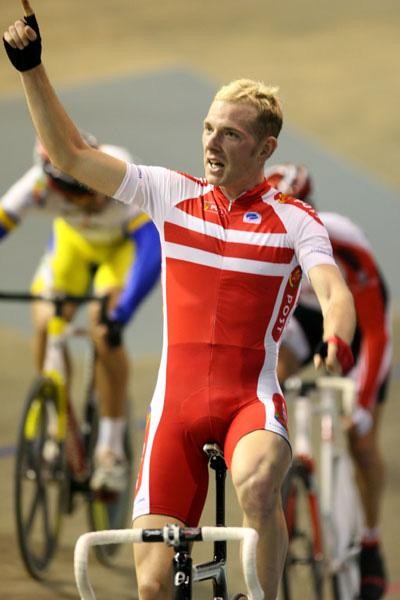
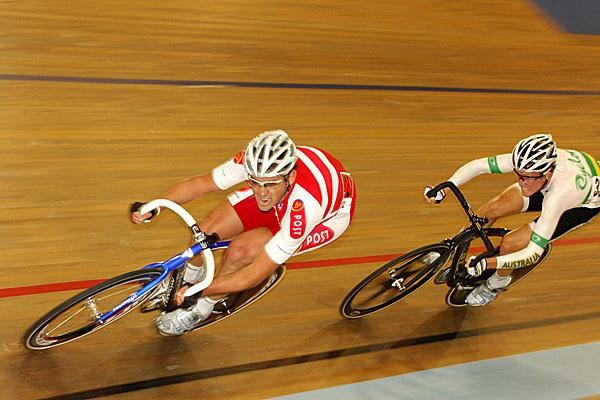

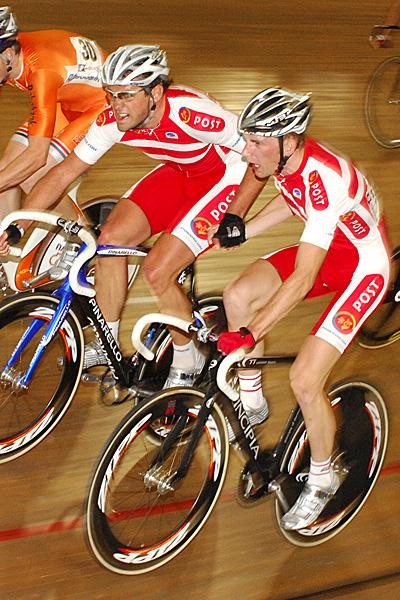
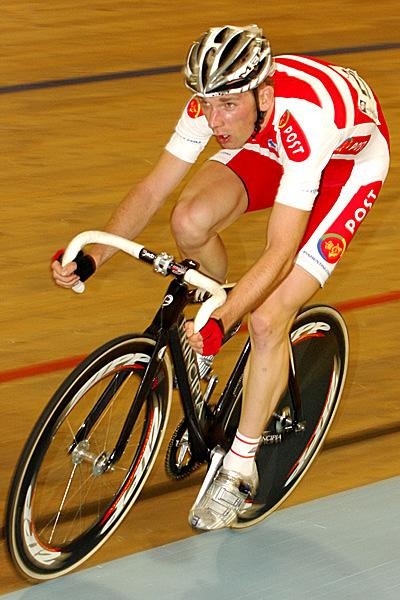



An interview with Alex Rasmussen and Michael Mørkøv, March 24, 2008
Danish Madison pair Alex Rasmussen and Michael Mørkøv have scored some of their best results this season, and look to be on track for a good result not only in the Manchester World Championships, but the Olympic Games in Beijing as well. Cyclingnews' Katharina Schulz caught up with the pair after their triumphant victory in the Madison at the Copenhagen World Cup.
When Danish cycling veteran Henrik "Rico" Elmgreen, organiser of the Copenhagen six day race, was asked to describe this year's pair number seven's qualities, he waxed lyrical. "Among Danes, they are hors categorie – in a class of their own," he described the top home town pair. "They simply are the answer to the kind of pair number seven that every Danish six day race is so desperately in need of."
The pair lived up to the honour, taking a closely fought second place overall to World Champions Franco Marvulli and Bruno Risi at the Copenhagen six day. Both halves of the pair in question are enthusiastic about the combination, too. "It was my biggest childhood dream to be able to wear the legendary number seven jersey. I have been hooked ever since I saw Jens Veggerby and Jimmi Madsen race when I was ten years old," Mørkøv said.
Mørkøv felt fortunate to walk in his idols' footsteps by slipping on the legendary jersey, but he is also happy to have found the ideal partner. "Alex and I raced against each other a lot when we were younger, each with his own partner." A former Danish national coach was the father of this match made in heaven. "At a world cup meeting in Sydney 2004, Tayeb Braikia, who was our national coach back then, teamed us up and it was a success," Mørkøv recalled. "Sure we only ended up in 14th place, but it laid the foundation for something more. Since then, Alex and I have raced together at every World Cup," he explained. The pair's consistency earned them the win in the UCI World Cup over the Netherlands and Belgium.
The two don't always race together, especially when six day organisers like to choose the pairings. "There were a few six day races, however, where we didn't team up. For example, 2008 was the first time we raced together at the Copenhagen six days." The two Danes were successful at the Grenoble six, taking the win on the final night.
His partner Alex Rasmussen is also positive that they complement each other perfectly. "I tried to race as pair number seven together with Jakob Piil last year, and it was exciting to race with Jakob, but this year it was just right. My future lies with Michael; it's fantastic to blossom together, and I hope we can write a new chapter in Danish cycling history with that."
Get The Leadout Newsletter
The latest race content, interviews, features, reviews and expert buying guides, direct to your inbox!
No relation to the other Rasmussen
Rasmussen caught international cycling's attention with his scratch title at the world championships in 2005 in Los Angeles, and emphatically underscored this impression with an 11th place in the U23 time trial at the worlds in 2006 and a Danish road championship in 2007. These results also go to show how multi-faceted a talent Rasmussen is.
Rasmussen is not the kind of rider that an international audience might expect on hearing his last name. The surname is a common enough in Denmark, but in international cycling it is first and foremost connected with Alex's now infamous fellow countryman Michael Rasmussen; although they certainly bear no physical similarities. "At the Tour of Britain in 2006, the organisers thought I was the one who had won the polka dot jersey in the Tour de France, and they were a bit surprised to find out that I weighed one and a half times as much as Michael Rasmussen."
While he is now concentrating on the track with the Olympic Games in Beijing as his ultimate ambition, Rasmussen will wait until after the Games to decide where his focus is going to lie - on the road or the track. His partner Mørkøv is somewhat less successful on the road, but nevertheless delivered his first victory in a UCI road race in the Giro del Capo this year, which also was the first victory of the season for his team, GLS Pakke Shop. As if to prove that he is not just fit for the banked track, he also fought hard for a good result on the Giro del Capo's hilly queen stage, a terrain which isn't naturally his. Speaking for the two of them, he said, "We're hoping to combine professional road racing with track racing in the future, i.e. to be able to keep competing in six day races and remain part of the national team, only to a somewhat lesser extent than now."
The next golden four
Mørkøv and Rasmussen together are also 50 % of the Danish 'dream team' which is going for team pursuit glory at the Beijing Games. Together with Casper Jørgensen, Jens-Erik Madsen and Michael Færk, who is scheduled to replace Mørkøv for the qualification heats, they are what is sometimes called "the next golden four" in Denmark, referring to the legendary lightweight coxless four that won the gold medal at the 1996 Olympics in Atlanta – also the year that Rolf Sørensen nearly won the Olympic road race.
"In 2004, when Casper Jørgensen and I became seniors, Tayeb Braikia was our national coach, so he started the team so to speak. However, he chose to quit after the worlds 2005 in Los Angeles. Half a year later, the DCU was ready to start a project for the Olympics 2008 together with Team Denmark. Heiko Salzwedel, who had helped Tayeb earlier, took up the job as trainer, and since then, we have worked our way up through a lot of diligence and seriousness," Mørkøv describes the team's history.
The road to success has not been an easy one, but it seems that the concerted effort that Team Denmark – an initiative that was created by the Danish government to support competitive sport – has put into the team is paying off. There have been reports that Salzwedel's leadership style was more dominant than freedom-loving Scandinavians are used to, but discipline certainly plays a role in a sport like team pursuit. "We have known all along that Heiko Salzwedel isn't Danish with all that goes along with that. The strength of this project lies in the fact that he is a world class coach, and like other coaches who are good at their job he has a strong personality and his own view of things," Jesper Worre from the Danish cycling federation DCU pointed out. "I actually think it's a good thing that both the riders and Heiko are their own man," he told Berlingske Tidende.
Mørkøv maintains that "the four of us have been lucky enough to hit off really well from the start, that was our strength from day one. Of course we've had our differences, but we're best friends." The results certainly underscore this statement: where four men ride at top speed just centimetres' apart, the team pursuit is a discipline that relies heavily on trust and confidence in each other. There is a hardly any other sport where knowing and trusting your team-mates is more important. Over the last few years, the Danish team has steadily improved its times, culminating in a new Danish record at 4.02.885 at this season's last world cup in Copenhagen in February.
Only one day later, Rasmussen and Mørkøv won a glorious victory in the Madison front of an enthusiastic home crowd, which also meant that they won the overall world cup. After the team pursuit, Mørkøv had been in two minds. "I am disappointed with my own performance," he told feltet.dk, but on the other hand he was proud of the national record.
In the Madison, they hadn't actually planned to attack so early in the race, but when Mørkøv accelerated to close the gap to the Americans who were in a breakaway, they ended up lapping the field too. "I actually just wanted to make the race hard for the Americans who were in the breakaway, and suddenly we had that gap. I was nervous right 'till the end, but it was indescribable to win in front of our home crowd."
As important as this victory was, however, there are also bigger goals left to pursue besides the Olympics. "A World Cup victory is always important, especially this one in Copenhagen, where we were able to show the Danish audience how good we are. But at a World Cup, the starting field is never the same as at an Olympic Games or the World Championships. So a world championship is always something special. Alex and I dream of being able one day to catch that rainbow coloured jersey, that is our biggest dream," Mørkøv admits.

Thank you for reading 5 articles this month*
Join now for unlimited access
Enjoy your first month for just $1
*Read 5 free articles per month without a subscription
After your trial you will be billed $7.99 per month, cancel anytime. Or sign up for one year for just $79